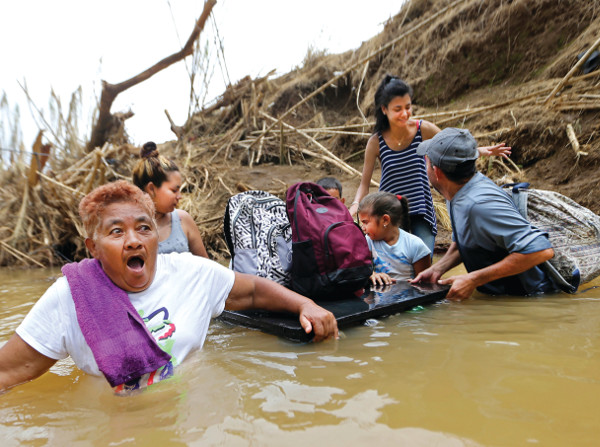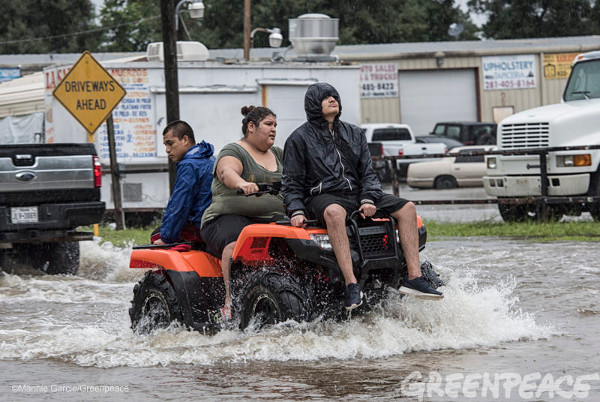
PHOTO/GERALD HERBERT, ASSOCIATED PRESS
The damage, injuries, deaths and government abandonment of people after the recent hurricanes that slammed Texas, Florida, Puerto Rico and elsewhere are just the first blow from the storms. The next blow will come when the government helps corporate vultures swoop in to profit from the destruction.
We can see what is coming based on the experience of New Orleans after Hurricane Katrina, and of Flint, Michigan after the poisoning of that city. In Flint, once the people got the word out that there was a disaster, the government response was slow and ineffective, and Flint continues to suffer today, more than three years later.
In New Orleans after Katrina, while government help for the people was slow or non-existent, the government actively aided the corporations in making the rich richer. Troops were brought in to suppress any resistance. Undamaged public housing was torn down and replaced with new mixed income housing, creating fewer units for the poorest. Many of the poorest workers were driven out of the city and never allowed to return. Private contractors profited hugely from the rebuilding effort. Unions were busted. Schools were privatized. The list goes on.
One woman in Houston recently wrote to a relative about “undocumented people who are living in mold infested apartments because they are afraid they will be deported if they ask for help. Many people being evicted because aid is slow in arriving for them; other people out of jobs because the business they worked for was either destroyed or so badly damaged that they cannot re-open. There are still several thousand people in shelters—many were homeless before the storm and present problems with placement . . . As usual it is the poor and the under-served who are suffering the most.” See below for information about Puerto Rico.

Yet the very state and federal government resources that people need to prevent or get through this kind of crisis—public aid for food and housing, healthcare, environmental protections, and infrastructure spending—have been cut back by politicians who then funnel the money into the military and tax cuts for the corporations.
Already, Houston Mayor Sylvester Turner has named the former head of U.S. operations for oil giant Shell to lead Houston’s post-hurricane recovery effort. This is a slap in the face to the victims, given that the fossil fuel industry is a major cause of global warming. And Trump pointed to Hurricane Irma as a reason to speed up action on corporate tax cuts—even before the hurricane made landfall.
By contrast, look at Cuba, where the government takes responsibility for the people’s welfare and mobilizes Cuban society to prepare for hurricanes and to help people afterwards. Though Irma was a devastating hurricane, Cuba was able to mitigate the deaths and damage. People in the US are 15 times more likely to die in a hurricane than people in Cuba.
There will be more disasters, both natural and economic. Are we going to continue allowing the corporations to loot the public treasury and capitalize on disasters while the rest of us suffer? We can demand that the government provide food, housing and healthcare to all those who need it. And let’s also visualize and fight for a new America, where the government truly serves the people, where people have everything they need to thrive, and where the whole country mobilizes to respond to disaster, whatever the cause. The corporations and billionaires are in the way. The people must step by step begin imposing our will on the government at every level, to make it a people’s government that will take over the corporations and use society’s wealth to serve all of us.
______________
Puerto Rico: Save the people, not the corporations
From the People’s Tribune
For years, Puerto Rico has been hammered by capitalism’s ongoing economic hurricane, and now Hurricane Maria has devastated the island. Some 3.5 million people have been left without electricity, without phones, and with little or no food, water, housing or medical care. As this is being written, many people are condemning the federal response to Puerto Rico’s desperate pleas for help as too slow and too little.
“The aid is too slow. They say it is coming from the United States, but who are they giving it to, because I haven’t received any at my house,” San Juan resident Joselyn Velasquez told the Chicago Tribune.
“After Georges hit us (in 1998) they responded quickly. But now? Nothing. We need water and food,” said Maria Rodriguez of Yabucoa.
Puerto Rico, like much of the global economy, has been in recession since 2006. Since 2006, the number of employed persons fell 21%, and manufacturing employment fell 38%. Average incomes are only one-third the mainland average, and the unemployment rate is double that of the continental US. Puerto Rico’s poverty rate is 46%. And the island now has $123 billion in debt—$74 billion in public debt, and $49 billion in pension obligations.
The Wall Street bondholders have taken steps to get their money despite the suffering of the people. Puerto Rico, essentially a US colony, is now run by a seven-member, unelected federal Financial Oversight and Management Board (FOMB) appointed by Washington under a law passed in 2016. The FOMB is similar to the emergency managers imposed on Detroit and Flint, Mich. Creation of the FOMB meant the end of democracy in Puerto Rico—the board has broad powers to impose financial and budget decisions on the island’s people.
Even before the dictatorial FOMB was created, previous island governments imposed budget cuts. The FOMB earlier this year proposed further cuts which would increase water rates while cutting funds to schools, public-sector jobs and pensions, health care spending, and the university system. Even with such cuts, the big bondholders are suing to demand that they be paid more, no matter how much the people must suffer. People have been fighting the austerity plans with marches and demonstrations.
Trump, who last year said he opposed any “bailout” for Puerto Rico, mentioned the island’s billions in debt “owed to Wall Street and the banks” in a Sept. 25 tweet, where he said the debt “must be dealt with” regardless of the hurricane. The mayor of San Juan replied by saying we must “put people above debt.”
In the wake of Maria, no doubt the corporate vultures will be swooping in, with the federal government’s help, to seize control of public assets like Puerto Rico’s electric utility. We can expect the bondholders will still demand payment.
Meanwhile, the people suffering from both Maria and the economic hurricane are left to fend for themselves. As a society we have the resources to provide immediate help and to restore Puerto Rico both physically and economically, and indeed to care for all our people. We must demand that the government be the people’s government; it can serve the corporations or the people, but not both.


“Defend PR”; yesterday evening on radio KPFA I heard a young man of the group Defend PR (Puerto Rico) talking about the group’s purpose to defend the people of Puerto Rico against the abandonment by the federal government. Defend PR has a list of demands, including to contact government at all levels and demand that the food/water, etc. aid that is and has been given to Puerto Rico be distributed along with a demand, among others to forgive the debt the Puerto Rican people have been asked to pay. Look up SF4PR, DefendPR on the internet.